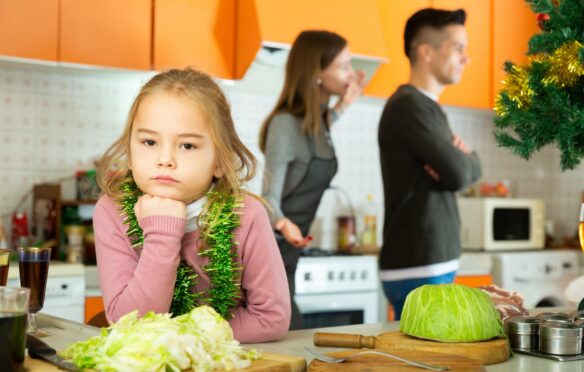Christmas should be joyful, merry, magical – or so the saccharine TV ads and jingly festive hits tell us.
But what if it’s not? What if it’s just… hard?
We’ve all been there, at one time or another. Sometimes, the pressure to make it ‘the most wonderful time of the year’ is enough to make us crawl back under our duvet.
Christmas is an emotionally charged time of year.
Families who might not otherwise spend much time together suddenly find themselves gathered around the table. The drink is free flowing. The bickering begins. Old grudges sneak out. Tempers fray. More wine is poured…
For others, it could be a lonely time, when grief and loss feels more acute.
‘Christmas has a shadow side’
To help us all ease into the festive season, we asked Professor Ewan Gillan for some advice on handling Christmas family conflict. Professor Gillan is a chartered psychologist and clinical director at First Psychology Scotland, which has clinics in Aberdeen, Inverness, Perth, Dundee, Edinburgh, Glasgow and the Borders.
Professor Gillan says the first step is to simply acknowledge the reality.
“Christmas has so many meanings that we can have unreal expectations,” he says. “It’s sold to us as a warm, uplifting time, but that’s not always how it goes. For many, it can be a time of real upset, where unresolved issues will rear up and we’ll need to deal with those.
“Christmas has a shadow side that we’re not presented with in the media. If we don’t recognise that going in, it can get difficult.”
Do a reality check
So, the first step in coping with family conflict at Christmas is to acknowledge that it exists. If we go in expecting perfection, we could be setting ourselves up for disappointment.
“Christmas is a unique event, because it brings families together in ways they wouldn’t normally,” says Professor Gillan. “That brings a range of opportunities for conflict and tension. It’s important to do a reality test, and then to think ahead and prepare.”
Professor Gillan points out that we do this in every other aspect of our lives – from preparing for an exam to running through interview scenarios for a job. When it comes to practical challenges, we make a plan. Yet with emotional ones, we often go in blind.
“Preparation is very important,” says Professor Gillan. “Think through all the potential stresses that could arise, and have a plan for how to deal with them.
Professor Gillan says it’s helpful to understand how our own thinking habits can affect situations. For instance, some people can take an ‘all or nothing’ approach, where they believe that Christmas will either be perfect or awful. Others might catastrophise, believing that if every tiny detail is not perfect, the whole thing will fall apart.
“Most people actually know their own problems and triggers, so taking the time to think about them in advance, can help. So can talking it through with a loved one.”
Make a plan – and go easy on the booze
With expectations set, you can now think of a plan. For instance, if a big family Christmas results in conflict, consider how to take a break.
“Christmas is an unusual experience because the rules we normally live by no longer apply,” says Professor Gillan. “How we structure our day, our focus on work or other routines, aren’t there. Often we are cooped up and that feels unusual and gives rise to a series of challenges.
“Think in advance about how to provide yourself with little breaks. That could be taking the dog round the block or going to the bathroom for five minutes to get a bit of space.
“If it feels overwhelming to think of the whole day, try breaking it into chunks. You can have different coping systems for different times of the day.”
If conflict does emerge, Professor Gillan advocates staying calm and removing yourself from the situation. That could mean saying strongly that you would like to change the subject, or it could mean excusing yourself to help you keep calm. “It’s not helpful to go round the houses with the same old arguments,” observes Professor Gillan.
Another thing that’s not helpful is the free flowing booze that often accompanies Christmas celebrations. “Alcohol can be a huge fuel and Christmas is a time of excess,” says Professor Gillan. “Yes, it can be uplifting and you can enjoy it, but it can also de-inhibit us, and make us feel more emotional and out of control. Then you have to deal with the consequences later.”
So instead of charging your glass for Dutch courage, Professor Gillan suggests saving the glass of bubbly for later. It could be a nice treat to celebrate a calm Christmas.
Stay in control
The most important factor throughout all this, is to stay in control. That means recognising in advance that the day might be difficult, and taking charge of it for your own mental health and wellbeing.
“Families are systems and any system can trigger us in certain ways,” says Professor Gillan. “The key is understanding and responding how you want, rather than being controlled by the situation.”
The most common issues First Psychology see are relationship breakdowns, or children falling out with their parents. Often, there are underlying emotional problems that bubble up over Christmas.
For others, Christmas is less about family conflict and more about feeling lonely. Many of Professor Gillan’s clients have found ways to cope that are actually very empowering.
“Often we collectively fail to appreciate that for so many, Christmas is a distressing and isolating experience,” he says. “The key is acknowledging that it won’t always be magical.
“Some of my clients treat Christmas like a normal day. Others treat it as a special day off just for them, and they have their own Christmas. Don’t sit and focus on what could have been. Instead, find something to do that makes you feel good.”
More from the Schools & Family team
Charitable Christmas: How to support another family in your area this Christmas
North and north east councils prepared if schools are forced to close

